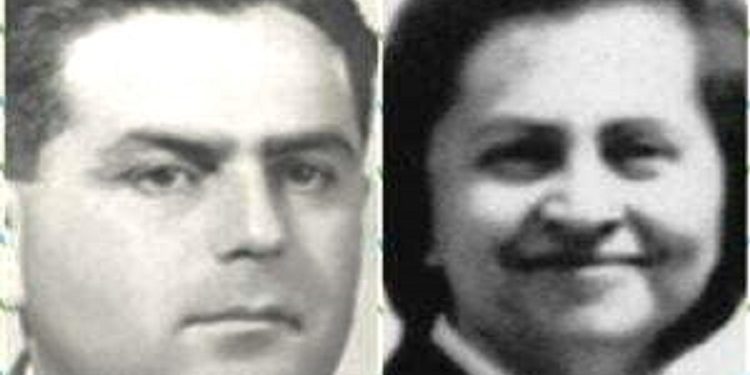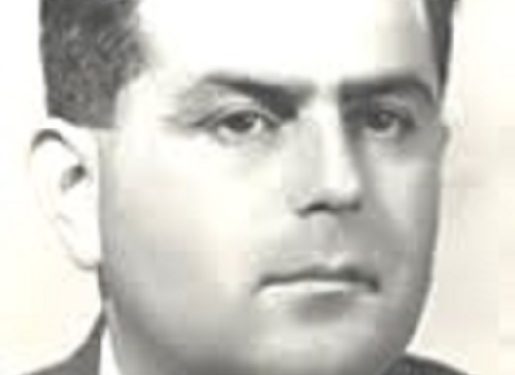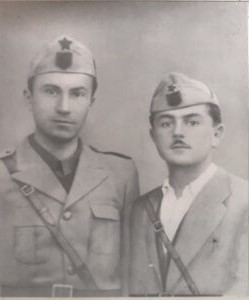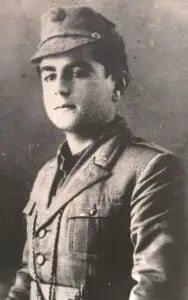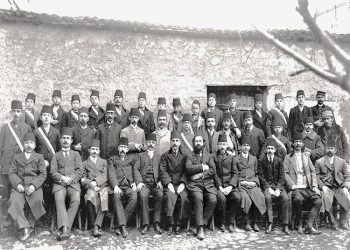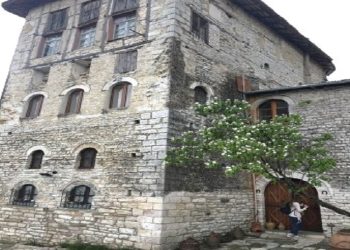Memorie.al / It is a strange fact that, during the National Anti-Fascist Liberation War, Skrapar considered Ramiz Aranitasi, Gjin Marku, Myqerem Fuga, Skënder Çaçi, Baki Duma, Dhosi Karagjozi, Bardhyl Frashëri and several others as its own sons, even though they originated from other regions. It loved, loves and honors them just like Kahreman, Zylyftar, Estref and many, many others, because not only were they in the same trenches as its own sons and guests in many village homes, but also because they knew how to repay that people with everything they had, even their lives.
This time we are talking about Myqerem Fuga, who was never separated from the Skrapar people, from Kahreman Ylli, Zylyftar Veleshnja, Sulo Gradeci, Mane Nishova, Nure Dobrusha, Njazi Çepani, Tajar Grepcka, Iljaz Sevrani, Shkëlqim Zaloshnja, Ismail Çelua, etc. Both during the War and afterward, we would be there for each other “for a thorn in the foot.”
The Fuga family house was a large house with many friends, and during the War, it became an important base. Myqerem, because of his intelligence and his internal motives, being sharp and energetic as an idealistic young man, was put in charge of the organs of the National Anti-Fascist Liberation War of the Berat District from the beginning of the war.
He was one of the main leaders of the Berat District Committee of the Albanian Communist Party and the Staff of the Berat District, as well as the right-hand man of Kahreman Ylli.
Where could you not find Myqerem? As a cultured propagandist, with his wisdom, kind words, and measured speech, Myqerem won the hearts, sympathy, and trust of the people throughout the Berat district, in Shpirag, Kuçovë, Lushnje, Nahije, Skrapar, and Tomorricë.
Myqerem had something special in his character; he had a loving angel with everyone, popular and easygoing, which is why he was so successful in his work of mobilizing people for the war. Where Myqerem set foot, there was no hesitation. He knew how to win people over. But he also knew where his support was.
You would find him at the family of Sinan Leshnja, known for their contribution in service of the homeland, as well as at the house of Pasho Hysi in Vërzhezhë; as well as in the great patriotic Zaloshnja family, of Mahmut and Hysen, at Asllan Osoja and in many other Skrapar homes.
Myqerem Fuga was born and raised in the “Murat Çelepias” neighborhood of Berat. He graduated from the “Normale” school in Elbasan and was certified as a teacher. Later, he went abroad to Florence, Italy, where he studied Literature, but he interrupted his studies to return to his homeland, influenced by the anti-fascist ideas of Qemal Stafa and others, joining the liberation war.
This cultural background of Myqerem, Kahreman, and many cadres of the Berat District Staff, led to the creation of several partisan formations with young men and women in the Myzeqe, Berat, and Skrapar areas. They held clear and unwavering positions with other forces, especially with Balli, and ensured victories in all battles with the enemy.
Myqerem was also one of the organizers of this powerful formation (the 7th Assault Brigade) created on March 17, 1944, in the village of Vlushë in Skrapar. In the staff of this brigade, he was entrusted with a very important and delicate task for the time, that of the head of the Political Section, a function he also carried out later when the 8th Assault Division was formed. Naturally, here too, he demonstrated great skills as a talented agitator and organizer in his assigned duty.
He was inseparable from all 121 battles that the 7th Assault Brigade fought, one of the brigades with the most actions, more than all the other partisan brigades. However, due to the excessive modesty of its main cadres, it was not given the title “Hero of the People,” unlike some other formations, not because they did not deserve it, but for the sake of truth, the 7th Brigade carried an extraordinary weight in the War, which its history best shows.
This is because 102 martyrs gave their lives outside the borders of our homeland alone. In all his combat activities, he had his wife, the legendary partisan, Shpresa Fuga (Hoxha), by his side. Shpresa was a fighter with dense activity in the Berat, Lushnje, Fier, and Skrapar areas, as a member of the Communist Party’s District Committee, tasked with working with girls and women after the murder of Margarita Tutulani.
As a couple, they were friends and comrades in good times and bad for decades with their fellow fighters from the areas where they had fought, even after the country’s liberation, until their passing. The War set Myqerem apart and made him a well-known and influential personality. And the country and future society had a great need for such people.
After the liberation, he held several high state and social duties and functions: Director of Cadre in the Ministry of Finance in 1945-46; member and vice-chairman of the State Plan Commission 1946-53; president of the Union of Consumer Cooperatives, which dealt with trade and artisanal enterprises.
With the creation of the Institute of Economic Studies at the Council of Ministers, he was appointed director of this institution; then, chairman of the Executive Committee of Tirana, Minister of Light and Food Industry, etc. He was a deputy of the People’s Assembly for the Berat district for several consecutive legislatures. For his special contribution, he was decorated with thirteen orders and medals of War and Labor.
Even after retiring in 1981, Myqerem did not stop working; on the contrary, he distinguished himself as a social activist, holding the functions of General Secretary and Vice-Chairman of the National Committee of Veterans of the Anti-Fascist National Liberation War.
Myqerem represented our country as a member of the Bureau of the International Federation of Resistance in Vienna, vice-president of the General Council of Buchenwald Dore, with its center in Paris; he represented the Organization of Albanian Veterans at several international congresses and meetings, etc., and he had close cooperation with the Italian veterans of the partisan battalion “Antonio Gramsci.” / Memorie.al




